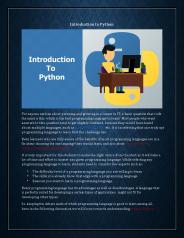Introduction to C Programming CE003121 - PowerPoint PPT Presentation
1 / 12
Title:
Introduction to C Programming CE003121
Description:
and Ragged Arrays. Allocation of Static Memory ... Ragged array example. Read a list of strings (one on each line) into an array where ... – PowerPoint PPT presentation
Number of Views:122
Avg rating:3.0/5.0
Title: Introduction to C Programming CE003121
1
Introduction to C ProgrammingCE00312-1
- Lecture 18
- Dynamic Memory Allocation
- and Ragged Arrays
2
Allocation of Static Memory
- A declaration such as char name100021,
allocates sufficient memory for 1000 names of 21
characters each. - This storage of 21 000 characters is reserved at
compilation time, i.e. before the program begins
execution. - This wastes space as most names are rather less
than 20 letters. - It also restricts names to a maximum of 20
characters. - We can resolve this wastage and restriction by
allocation of memory as and when required, during
execution of the program.
3
Dynamic Allocation using malloc function
- A standard function, malloc(n) allocates n bytes
(for n characters) in memory and returns a
pointer to it. - For example the following code
- Prompts the user for the size of the string
- Reads the size
- Allocates memory for a string of this size
- Reads the string
4
Example using malloc
- int size
- char s
- printf(\nhow many characters?\n)
- scanf(d, size)
- s malloc(size1) // one extra for \0
- printf(type string\n)
- gets(s)
- allocates only enough memory for the expected
string.
5
Use of malloc for any data type
- malloc can be used to allocate memory for any
ltdata typegt. - ltdata typegt ltvariablegt // pointer to ltdata
typegt - // some other code here
- ltvariablegt (ltdata typegt )malloc(n
sizeof(ltdata typegt)) - allocates sufficient memory for n values of
ltdata typegt and returns a pointer which must be
casted as the same pointer type as the
ltvariablegt.
6
Using malloc for an array of integers
- For example
- To allocate storage for 10 integers
- int p
- p (int ) malloc (10 sizeof(int))
- This is machine-independent, as sizeof returns
- size of an integer for any machine.
7
Ragged Arrays
- Declare 6 variable length names array of string
pointers - char name6
- abdul, abraham, al , bill, fred,
jean-pierre - We can declare functions on ragged arrays
- void print_list(char table1 , int n)
- so that it can deal with strings of any length.
8
Ragged array example
- Read a list of strings (one on each line) into an
array where - the size of each element is precisely the length
of each - string, ie the strings are of variable length - a
ragged array. - include "stdio.h"
- include "string.h"
- include "stdlib.h" // for malloc
- // prototypes
- void sort(char , int)
- int read_strings(char , int)
- void print_strings(char , int)
9
Main function
- int main(void)
- char list1000
- // array of 1000 string pointers
- int n // actual number of strings
- n read_strings(list, 1000)
- // read n strings, max of 1000
- sort(list, n) // sort n strings
- print_strings(list, n) // print n strings
- return (0)
10
print_strings function
- void print_strings(char list, int n)
- int i
- printf("\nalphabetical order is\n\n")
- for (i0 iltn i)
- printf("s\n", listi)
11
void sort(char a, int n) // array of n
strings as pointers int i, j char temp //
string pointer for (j n -1 j gt 0 j--) //
each pass of j comparisons for (i0 i lt j
i) // each comparison if
(strcmp(ai, ai1) gt 0) // swap
the POINTERS temp ai
ai ai1 ai1
temp // else no swap //
end of pass // end of all passes // end
sort
12
int read_strings(char list, int max) int i
0 char line81 // store for each
line printf("\ntype one string per
line\n") while (gets(line) ! NULL i lt max)
// while not end of input listi
malloc (strlen(line)1) // listi big
enough // for line 1 for \0
strcpy(listi, line) // copy line
into listi i // next element return
i // actual number of strings































